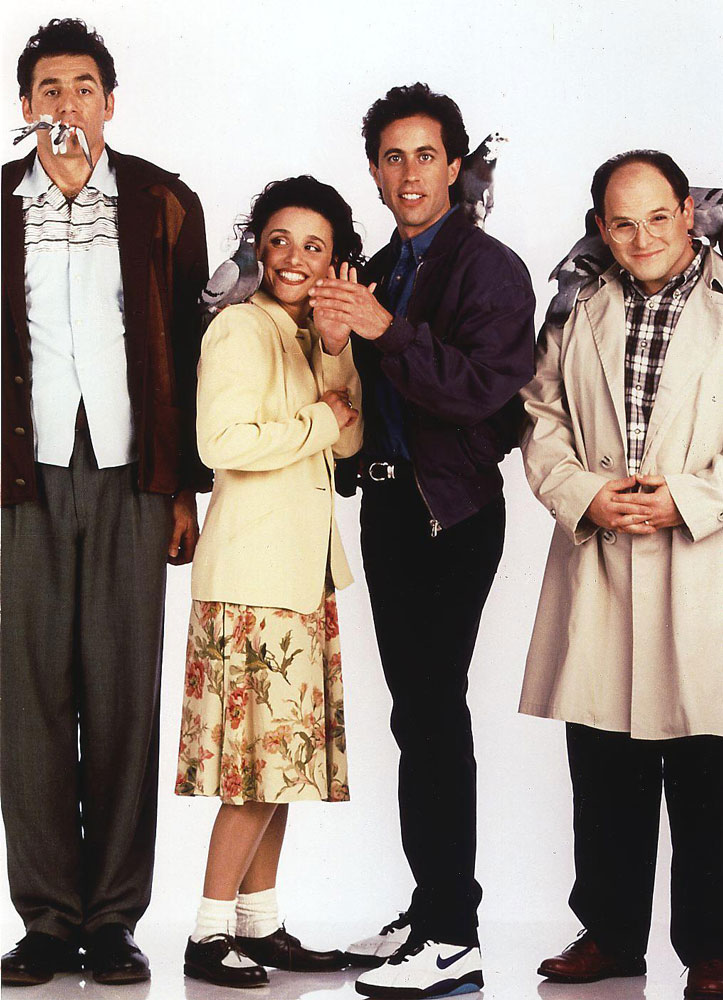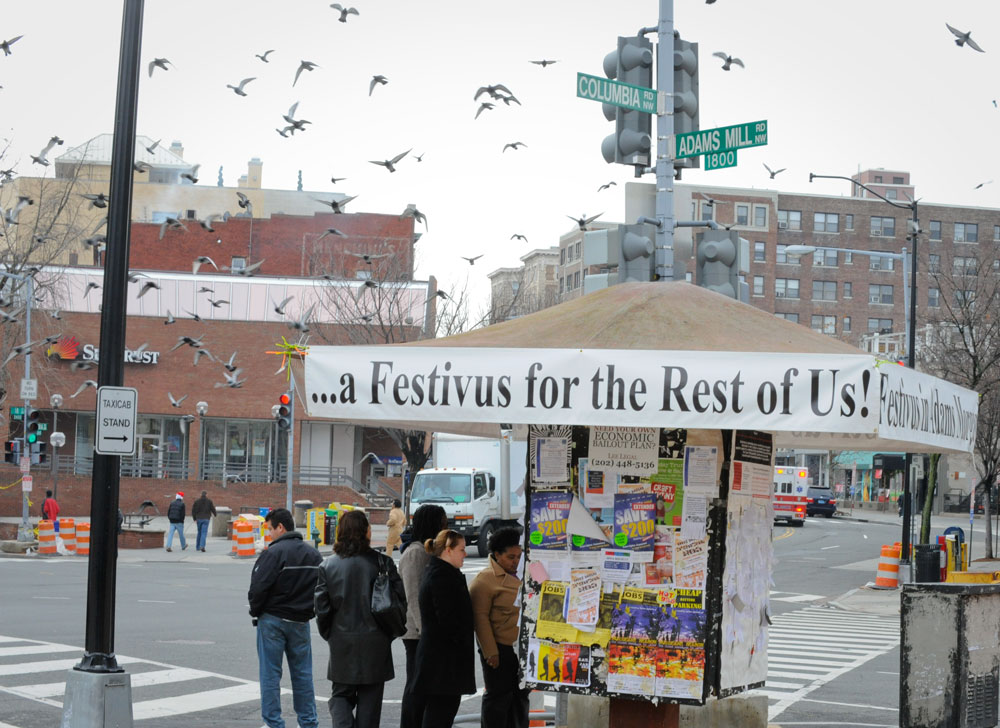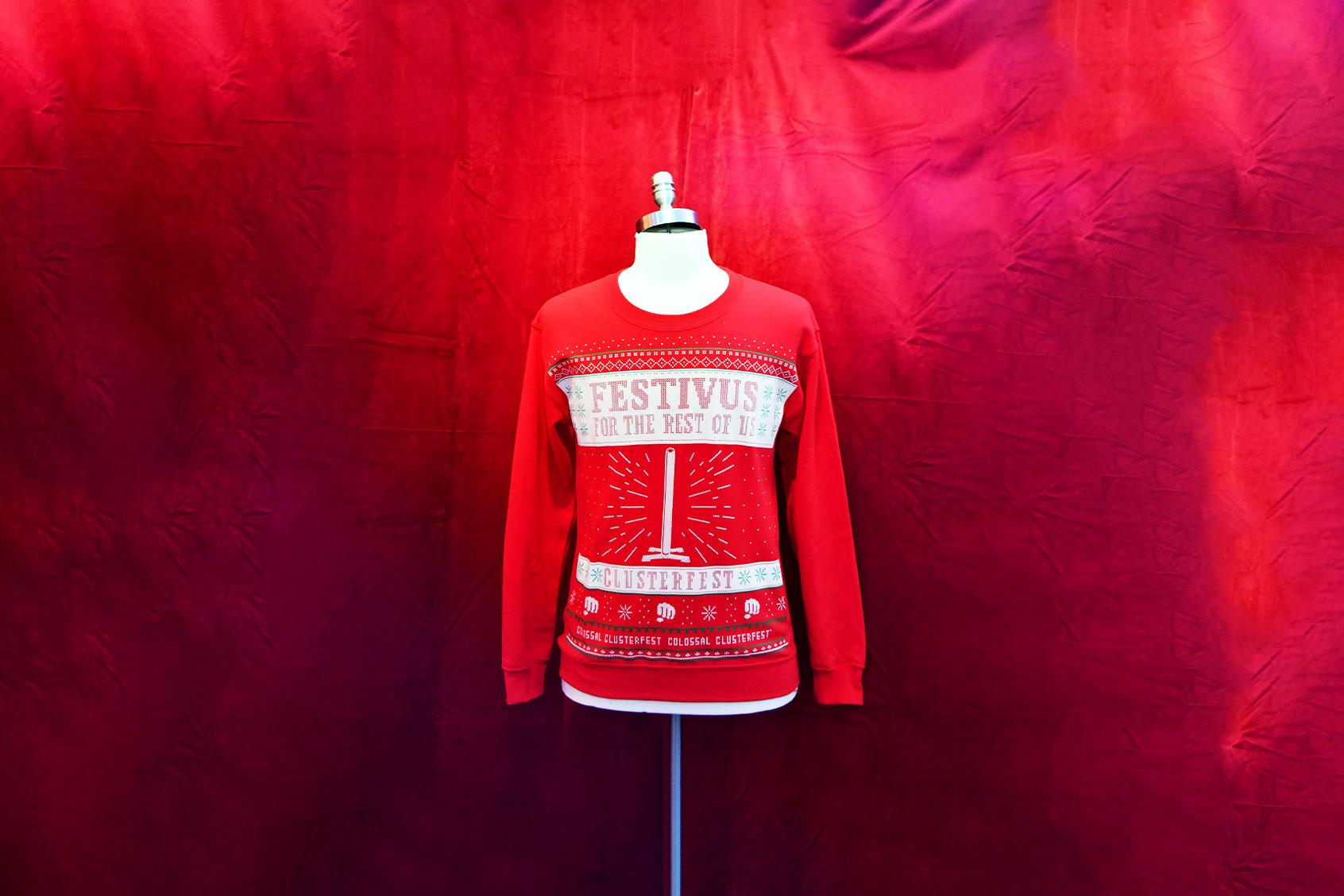It happened one December . . . I think. It’s just likely to have occurred closer to Black Friday. In any event, one wintry day my block’s self-appointed grandmother to all called me regarding the local traffic circle’s seasonal decorations, which she lovingly curates throughout the year.
She wanted to know: Did I, a heathen and reprobate who lives within a convenient walking distance from her home, find them offensive? She asked because a driver pulled up to her as she was staging that year’s display and irately scolded her for placing Christmas iconography on taxpayer-funded property.
For the record, we’re talking about a few large cardboard boxes wrapped to resemble gifts, some cutouts of toys and candy canes, and shiny baubles dripping from the lowest branches of the circle’s very large tree. No mangers, no wise men, nary a star of Bethlehem was in sight – just a smattering of seasonal delights for the eyes. Not offensive at all, I said, at which she expressed great relief.
But it also got me thinking about what the majority of us would rather see during the darkest months on the calendar, a few brightly colored cubes strewn at the base of a tree or an unadorned aluminum pole to acknowledge Festivus, the secular holiday introduced on “Seinfeld” 25 years ago?
Having known a few smug super lefties in my time – and technically, these are supposed to be my people – I’m guessing the answer would be “nothing,” because that is morally superior and boring choice.
Then again, there’s something to be said for embracing that holiday “for the rest of us.”
Festivus is typically celebrated on Dec. 23 but the 18th of this month marked 25 years since “Seinfeld” first introduced it to the public in a ninth-season episode called “The Strike.” That half hour revealed that George Constanza’s father Frank (played by the late, amazing Jerry Stiller) invented Festivus as his way of pushing back against all the commercial and religious aspects of Christmas, and also to torture George.
 The cast of NBC’s popular comedy series “Seinfeld” (FILES/AFP via Getty Images)Several intersecting spokes of nonsense dominate the episode, during which Festivus is regularly mentioned but not centrally featured until the final scenes. George, Elaine, Jerry and Kramer celebrate with the Costanzas, alongside a pair of oily bookies Elaine was trying to avoid, a woman Jerry has second thoughts about dating and George’s boss Mr. Kruger (Daniel Von Bargen).
The cast of NBC’s popular comedy series “Seinfeld” (FILES/AFP via Getty Images)Several intersecting spokes of nonsense dominate the episode, during which Festivus is regularly mentioned but not centrally featured until the final scenes. George, Elaine, Jerry and Kramer celebrate with the Costanzas, alongside a pair of oily bookies Elaine was trying to avoid, a woman Jerry has second thoughts about dating and George’s boss Mr. Kruger (Daniel Von Bargen).
There’s something to be said for embracing that holiday “for the rest of us.”
Kruger is the true reason we witness Festivus transpire in all of its weird magnificence, since George failed to scam $20,000 from Kruger by creating a fake charity called The Human Fund. He thought this would be a suitable way to get back at Kruger for making a donation in his name to a children’s charity instead of giving him a gift. (“I got him Yankee tickets. He’s saying, ‘I gave your gift to someone else’ . . . Where’s your Christmas spirit? An eye for an eye!”)
George returns the money, but Kruger isn’t convinced his employee isn’t also lying to him about his family’s season tradition. So he forces George to bring him to dinner as emotional blackmail. Thus, a quarter-century’s worth of pop culture merriment was hatched.
In the 25 years since “The Strike” was first introduced, it has become a highly unofficial part of the holiday season, invisibly taking its place beside solstice celebrations, Hanukkah, Kwanzaa, Christmas and We’re Taking It Easy Day. During that time the War on Christmas also flourished into an annual needless concern, although right-wingers still buy into it. (And regrettably, Sen. Rand Paul, R-Ky., co-opts Festivus each year to spew his discontent on Twitter.)
Saying “Happy Holidays” or “Seasons Greetings” with all the joy in your heart can still be considered an unprovoked salvo to those winter wonderland warriors, who may return your good wishes by growling “Merry Christmas” through gritted dentures.
One’s reflexive choice of greeting identifies the side of the partisan divide upon which side a person has planted their flag. According to a 2016 poll by the non-partisan Public Religion Research Institute, the United States is pretty much evenly divided between people who believe businesses should greet customers with a non-denominational holiday greeting (47%) and those who don’t (46%). In case you’re wondering, 2016 is the most recent PRRI poll data available on this topic, presumably because most people think this supposed “crisis” is insipid.
Whatever irritation someone may experience over hearing or not hearing “Merry Christmas” doesn’t merit the type of counteroffensive in which a stranger harasses a well-meaning person trying to bring a little levity to the world in whatever way seems natural to them.
However, if you feel that level of pettiness in your soul, wishing the world a Happy Festivus may be one of the jolliest things you can do.
Festivus and its limited accouterments are an exercise in austerity to an absurd degree. It’s also a practical holiday that offers, among other release valves, a controlled forum for unburdening oneself of resentments, the Airing of Grievances. There are the Feats of Strength, through which the head of the household may reassert his or her dominance by pinning the family member of their choice in a wrestling match.
 Washington, DC Festivus kiosk in Adams Morgan where residents can write their complaints (Sarah L. Voisin/The The Washington Post via Getty Images)
Washington, DC Festivus kiosk in Adams Morgan where residents can write their complaints (Sarah L. Voisin/The The Washington Post via Getty Images)
Let others fret over preparing turkeys and hams with all the sides. Festivus celebrants dine upon meatloaf. And a publicly displayed Festivus pole isn’t a terrible idea amid this season of consumerist excess.
If you feel … pettiness in your soul, wishing the world a Happy Festivus may be one of the jolliest things you can do.
All told, Festivus is a good-natured affair that accompanies other holidays as opposed to supplanting them. Frank Costanza might disagree with that characterization. Then again, Frank didn’t invent Festivus. That honor goes to the father of one Dan O’Keefe, one of the episode’s writers. According to O’Keefe, who wrote about the holiday’s true origins in his book “The Real Festivus: The True Story Behind America’s Made-up Holiday,” his father Daniel O’Keefe Sr., a former editor with Reader’s Digest, came up with the holiday more than three decades before “The Strike” aired, in 1966.
O’Keefe’s book and interviews he’s given over the years correct a few Festivus details cemented in place by “The Strike.” Foremost is that Festivus wasn’t necessarily held on Dec. 23, a date established in “The Strike.” In the O’Keefe household, it could take place at any time between October and May.
The One True Festivus doesn’t involve an aluminum pole, either. Instead, the O’Keefe family venerated a clock in a bag. No explanation of why was ever given. In “The Strike,” Estelle Costanza (Estelle Harris) serves up meatloaf sliced on a bed of lettuce and a bowl of peas that surrendered their will to live long before they met a kitchen. The O’Keefes’ Festivus dinners had much more variety and probably didn’t involve O’Keefe Sr.’s boss drinking from a flask.
Want a daily wrap-up of all the news and commentary Salon has to offer? Subscribe to our morning newsletter, Crash Course.
The “Seinfeld” writer’s parents and siblings aired their grievances by kvetching into a tape recorder. In that respect, that self-righteous commuter who harassed Jean may have believed they were observing Festivus tradition by making a nice elderly person feel terrible, although I believe both the O’Keefes and the Costanzas may have encouraged them to save it for dinner and their podcast.
But if you must take a stand on this issue, let it be one fitted with a metal stick dragged out of a crawl space, preferably with a very high strength-to-weight ratio. Plant it proudly where all can bask in its glory, whether that place of honor is at the center of your lawn or your local traffic round.
Be not upset if most people don’t notice its presence since that is the point. Only you need to know the Festivus pole is a grand metal digit to both the idiotic insistence that the season belongs only to one religion and the equally fervent passion demanding that the bleak midwinter be a show about nothing. It’s a way of saying to the world “I got a lot of problems with you people, and now you’re gonna hear about it” without using words.
It may even bring good cheer to people you’ve never met before. That qualifies as a Festivus miracle.
“Seinfeld” is available to stream on Netflix.

